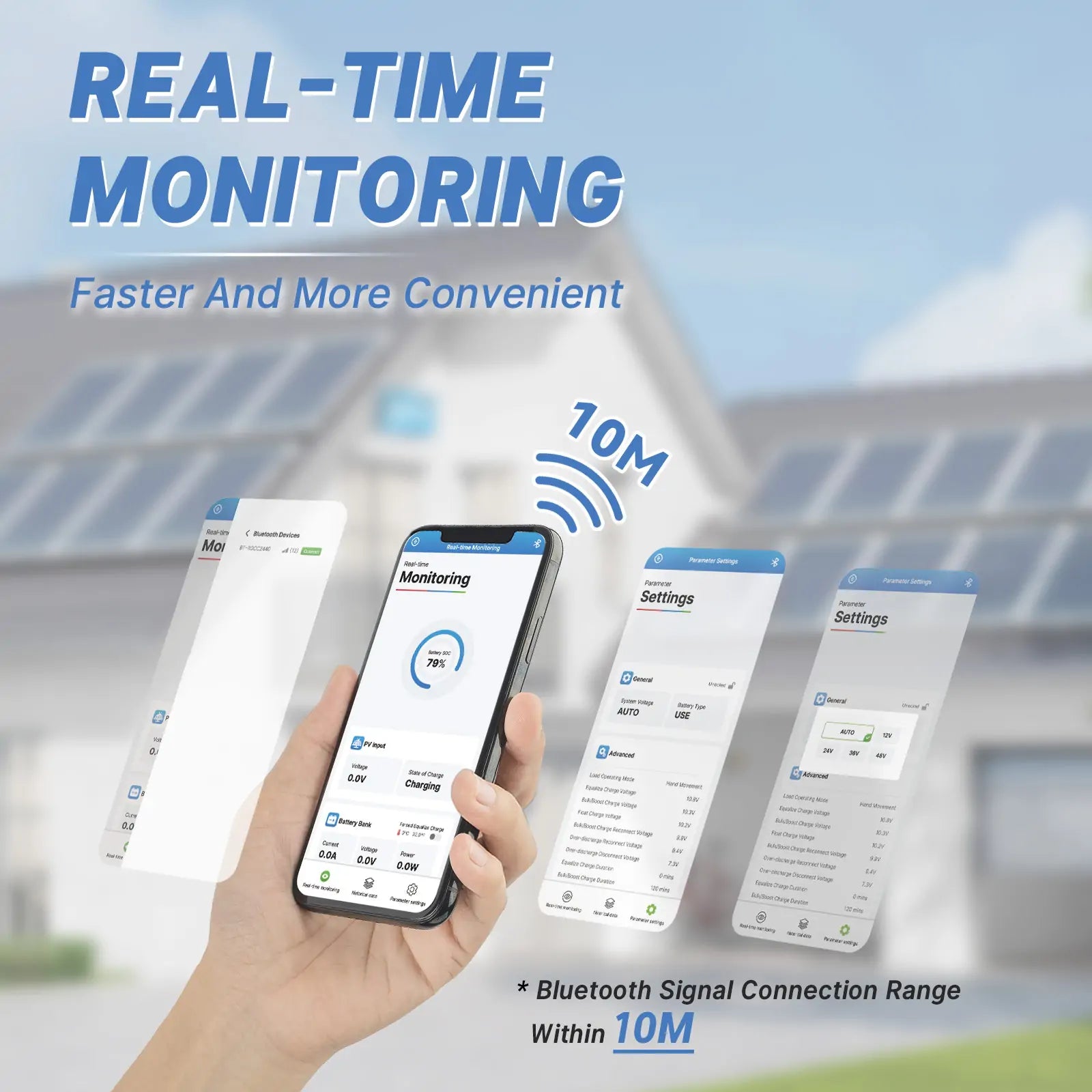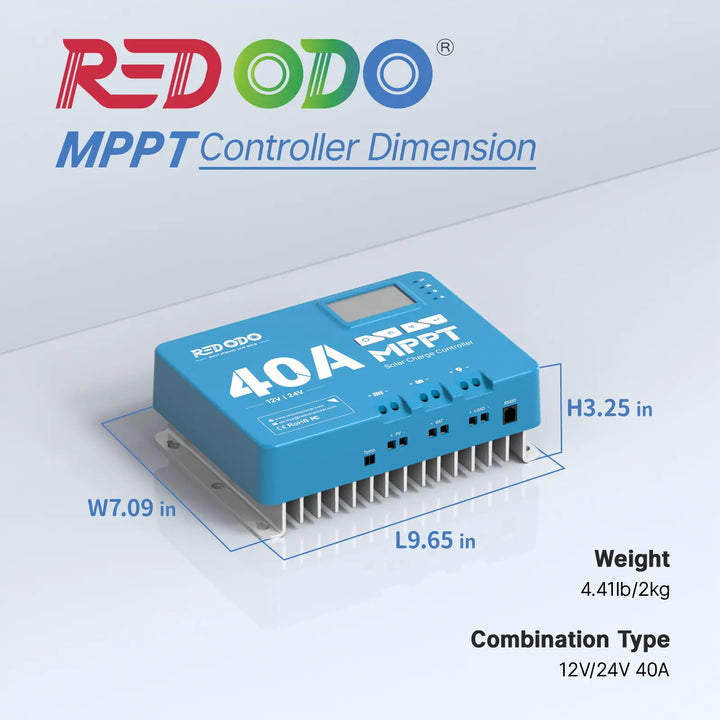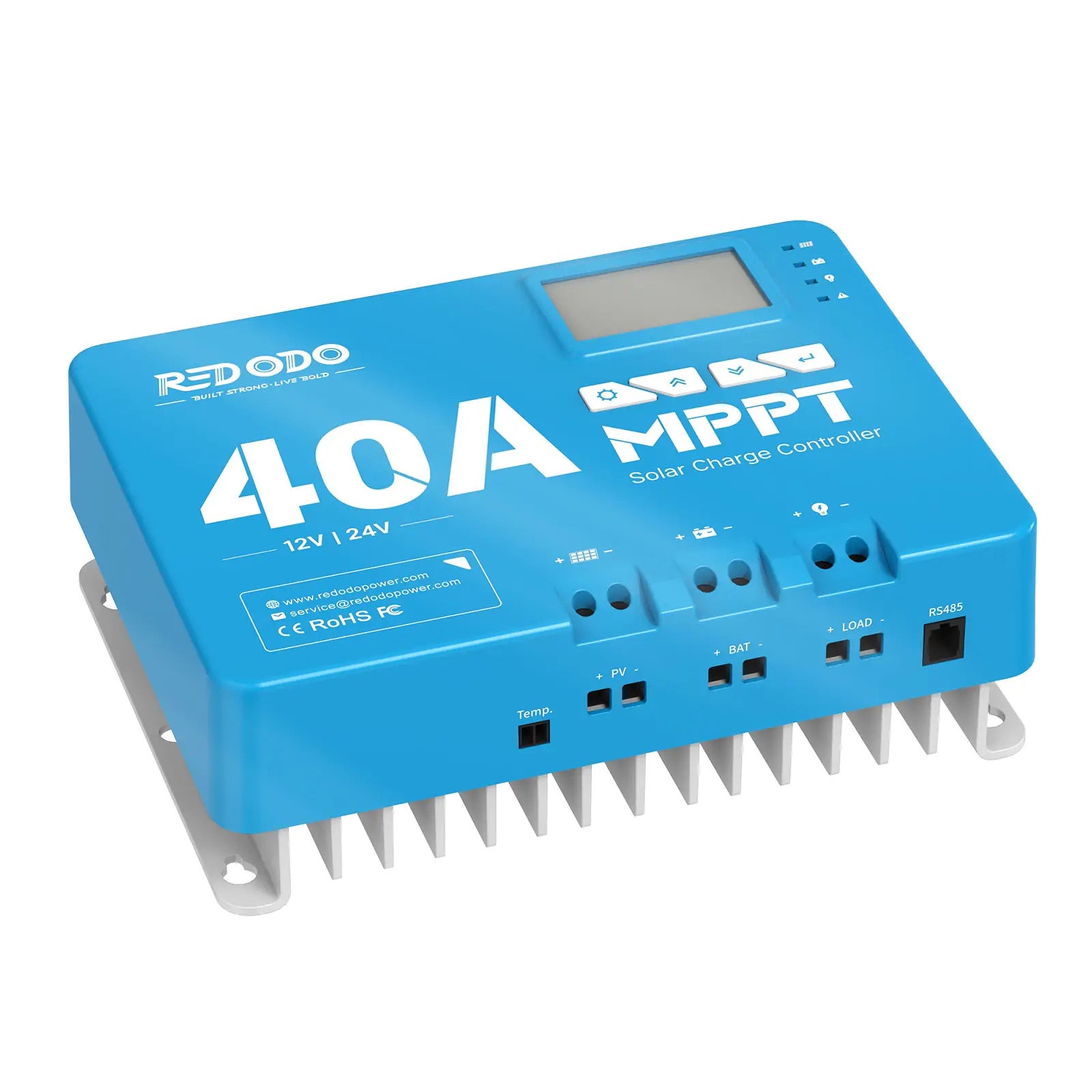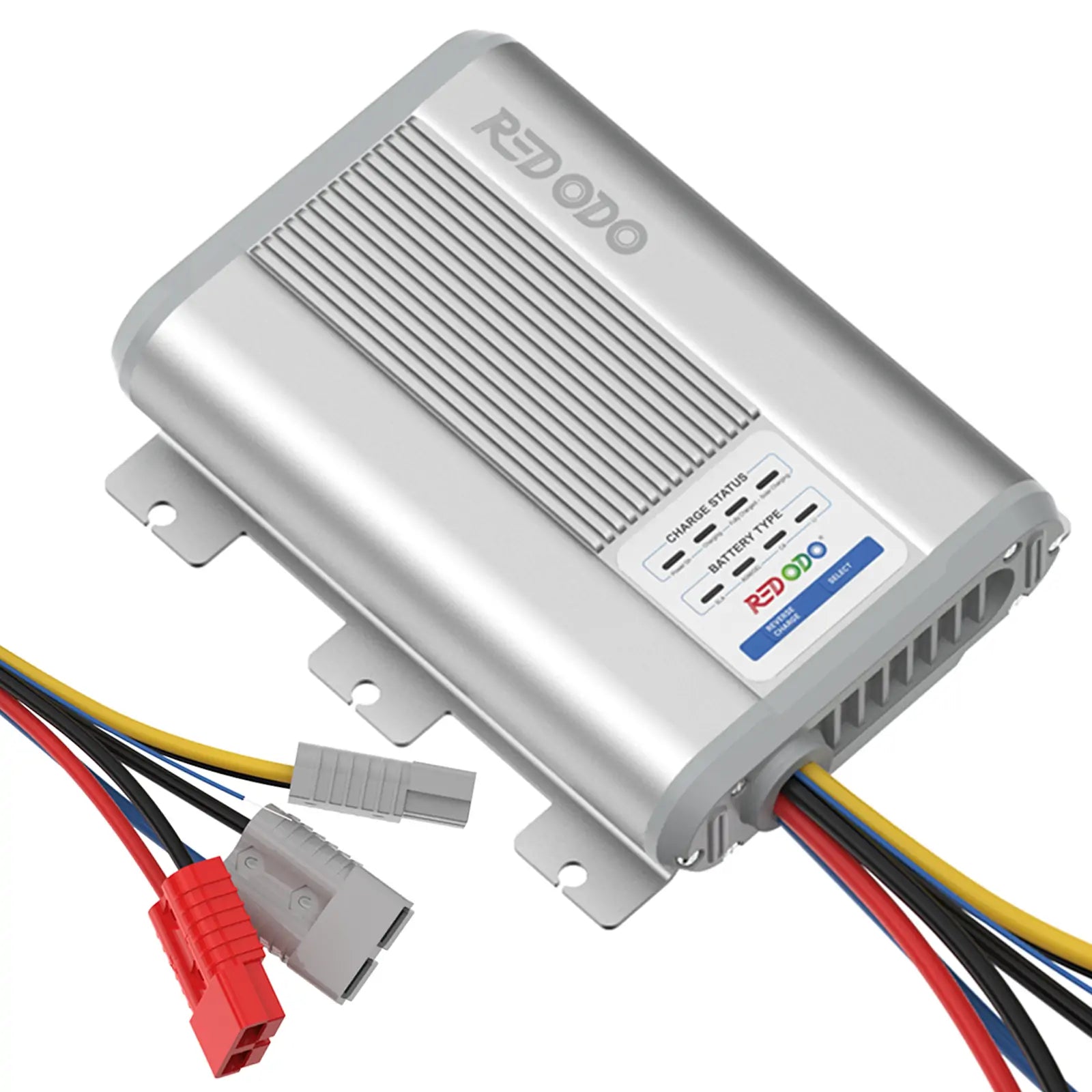MPPT (Maximum Power Point Tracking) and PWM (Pulse Width Modulation) are two common types of solar charge controllers. They play a vital role in effectively harnessing and managing solar energy.
In this comprehensive guide, we will explore the key differences, benefits, drawbacks, and applications of both options, aiding you in making an informed decision for your renewable energy setup.
Table of Content
What is Solar Charge Controller?
A solar charge controller is an essential component in a solar power system as it ensures the optimum performance and longevity of the battery by preventing overcharging or over-discharging. It also optimizes energy conversion from the solar panels to the battery.
Its primary function is to regulate the flow of current and voltage from the solar panels to the battery bank. Here are a few reasons why a solar charge controller is needed:
- Battery Protection: Solar charge controllers protect the batteries from overcharging and deep discharging during high solar input.
- Energy Optimization: They help optimize the energy conversion by adjusting the voltage and current to match the MPP (maximum power point) of the solar panels.
- System Efficiency: They regulate the charging process to ensure maximum efficiency and prevent energy wastage.
- System Monitoring: Some charge controllers come with monitoring capabilities. This helps in identifying potential issues and optimizing system performance.
What is MPPT Charge Controller?
MPPT, or Maximum Power Point Tracking, is an advanced technology integrated into solar charge controllers. Its main role is to optimize the energy output of solar panels by continuously adjusting to the maximum power point on the panel’s voltage-current curve. This allows MPPT controllers to extract the most energy possible, even when environmental conditions such as sunlight intensity vary across your region.
![]()
Advantages of MPPT
- Efficiency: MPPT controllers are more efficient than PWM controllers, especially in situations when the solar panel's voltage is much higher than the battery voltage. MPPT controllers track the maximum power point of the solar panel and convert excess voltage into additional charging current, resulting in improved overall system efficiency.
- Energy harvest: MPPT controllers can extract more energy from the solar panels because they can adjust the voltage and current to match the maximum power point of the panels under various environmental conditions. This results in higher energy production, especially when panels are under partial shading or temperature variations.
- Flexibility: MPPT controllers are generally more versatile and can be used with various solar panel configurations, including higher voltage panels. They can also be used with battery banks of different voltages.
Disadvantages of MPPT
- Cost: MPPT controllers are generally more expensive than PWM controllers due to their advanced tracking and conversion capabilities. However, the cost difference is decreasing over time.
- Complexity: MPPT controllers involve more complex electronics and require a more sophisticated charging algorithm. This complexity can make them slightly more challenging to install and configure.
What is PWM Charge Controller?
PWM, or Pulse Width Modulation, is a more basic and cost-effective technology used in solar charge controllers. It regulates the charging process by rapidly switching the current flow to maintain a constant voltage. Once the battery reaches the target voltage, the PWM controller modulates the width of the pulses to reduce the power sent to the battery.
Advantages of PWM
- Simplicity: PWM controllers are simpler in design and operation compared to MPPT controllers. They have fewer components and are generally easier to install and configure.
- Cost: PWM controllers are generally more affordable compared to MPPT controllers, making them a more budget-friendly option, especially for small-scale solar power systems.
Disadvantages of PWM
- Efficiency: PWM controllers do not have tracking capabilities and simply restrict the panel voltage to the battery voltage, resulting in some power loss.
- Flexibility: PWM controllers are generally better suited for lower voltage solar panels and battery banks. They have limited compatibility with higher voltage panels and battery banks.
Is MPPT Really Better Than PWM?
When it comes to choosing between PWM and MPPT charge controllers for your solar power system, it ultimately depends on your specific needs, budget, and requirements.
PWM charge controllers are a suitable option for smaller solar systems and for PV panels with a maximum power voltage (Vmp) of up to 18V for charging a 12V battery (or 36V for a 24V battery, etc.). These controllers are more appropriate when efficiency is not a critical factor, such as in trickle charging scenarios. They are also simpler to install and configure, making them a more affordable option.
On the other hand, MPPT charge controllers are ideal for larger solar systems where achieving maximum efficiency is important. These controllers can boost the efficiency of your solar system by up to 30%, making them particularly beneficial for residential rooftop setups.
The MPPT charge controllers are also beneficial when the total voltage of the solar arrays exceeds the voltage of the battery being charged. For example, if you have a residential solar system charging 12V batteries, an MPPT controller would be more suitable.
In summary, MPPT controllers offer higher efficiency, better energy harvest, and more flexibility, but come at a higher cost and some increased complexity. PWM controllers, on the other hand, are simpler, more affordable, but less efficient and less flexible with higher voltage configurations.
MPPT Recommended: Redodo 40A MPPT Solar Charge Controller
Experience advanced tracking technology and maximize your solar power potential with the Redodo 12V/24V 40A MPPT solar charge controller.
- High Efficiency: This controller boasts an impressive tracking efficiency of up to 99% and a peak conversion efficiency of up to 98%. It intelligently tracks the maximum power point of your solar panel array, ensuring that your battery and load receive the maximum power for efficient charging.
- Real-time Monitor: The Redodo MPPT controller comes equipped with a built-in Bluetooth module and an RS485/Bluetooth communication port. By simply connecting a Bluetooth adapter (included in the package), you can remotely monitor the real-time status of your solar panels, batteries, and loads.

- Convenience: The LCD display and LED indicators provide a clear view of the data, and the four operating buttons make navigation a breeze.
- Versatility: It has a LiFePO4 battery charging mode by default, suitable for most lithium iron phosphate batteries on the market. Additionally, by adjusting the parameters, it can be compatible with other types of batteries, including sealed and gel-type lead-acid batteries.
- Safety: The controller is equipped with built-in protection for reverse connection, overpower, overvoltage, short-circuit, and over-temperature situations, providing comprehensive safety protection for your entire solar system.
- Sustainability: The multifunctional shell of Redodo MPPT charge controller is made of aluminum alloy, ensuring effective heat dissipation while minimizing power loss.
With the Redodo 12V/24V 40A MPPT solar charge controller, you can optimize your solar power system's performance and enjoy the benefits of efficient and reliable charging.

Things You Need to Notice When Using MTTP
When using an MPPT charge controller for your solar power system, there are a few important things to keep in mind:
- Panel and battery compatibility: Ensure that your MPPT controller is compatible with the voltage and current ratings of your solar panels and batteries. Different controllers have different input and output specifications, so double-check the compatibility to avoid any damage to the equipment.
- Proper wiring and connections: Follow the manufacturer's instructions for wiring and connections to ensure they are done correctly. Improper wiring can lead to inefficiencies or even damage to the charge controller or other components of the system.
- Overvoltage protection: MPPT controllers have built-in overvoltage protection to safeguard the batteries from damage due to excessively high voltage. However, it is still essential to monitor the system and ensure that the voltage remains within the acceptable limits.
- Temperature compensation: MPPT controllers typically have temperature compensation features that adjust the charging parameters based on the ambient temperature. This compensates for the temperature-dependent changes in battery performance and maximizes charging efficiency. Make sure to set the temperature compensation according to the manufacturer's recommendations.
- Monitoring and maintenance: Regularly monitor your MPPT charge controller's performance, especially the system voltage, current, and battery status. Keep an eye out for any anomalies or issues that may indicate a problem with the controller or system. Also, periodically check for any dust or dirt accumulation on the controller and clean it if necessary.
By paying attention to these aspects, you can ensure optimal performance and longevity of your MPPT charge controller and solar power system.
Summary
In summary, MPPT charge controllers are newer and more advanced compared to PWM controllers. They have the ability to track the maximum power point of the solar panel and adjust the voltage and current accordingly for maximum energy harvest. However, PWM controllers are simpler and more affordable, making them a suitable option for smaller systems or those on a limited budget.
If you are unsure about any aspect of installing or using a charge controller in your solar power system, consult the manufacturer's instructions or contact us by service@redodopower.com to seek professional help.
------------------------------------------------------------------
Learn More About
[2023] A Comprehensive Guide on How to Store LiFePO4 Batteries
[Full Guide] Can I Charge LiFePO4 Battery with a Normal Charger
![[Ultimate Guide] MPPT vs. PWM Solar Charge Controller](http://www.redodopower.com/cdn/shop/files/Reodod_logo1.jpg?crop=center&format=webp&height=24&v=1730185167&width=24)
Redodo
![[Ultimate Guide] MPPT vs. PWM Solar Charge Controller](http://www.redodopower.com/cdn/shop/files/Reodod_logo1.jpg?crop=center&format=webp&height=24&v=1730185167&width=24)
Redodo
Recent Post

Convert RV from Lead-Acid to Lithium Battery: A Complete Guide

How Long Will a 200Ah Battery Run an Air Conditioner?

A Full Review of Redodo 12V 140Ah Group 31 Deep Cycle Battery

How Much Does it Cost to Replace Golf Cart Batteries?



![⚡[$340 after Sign-Up] Redodo 12V 200Ah Low Temp Lithium Battery | 1280W Load Power | For RV, Solar, Off-Grid](http://www.redodopower.com/cdn/shop/files/Redodo12V200Ahlowtempcutofflifepo4battery_0e3042f8-41ec-49a2-8586-705d8fa25a7c.jpg?v=1741251295)
![⚡[$165 after Sign-Up] Redodo 12V 100Ah Lithium Trolling Motor Battery With Low Temp Protection](http://www.redodopower.com/cdn/shop/files/Redodo12V100Ahlow-tempbattery.webp?v=1738462317)
![⚡[$496 after Sign-Up] Redodo 12V 300Ah Lithium LiFePO4 Battery | Replaces 6*12V 100Ah AGM Batteries | RV, Marine, Solar](http://www.redodopower.com/cdn/shop/files/Redodo_12V_300Ah_Lithium_Battery_fe27f603-e18b-4c4a-9105-848685f2fcdb.jpg?v=1743157570)
![⚡[$947 after Sign-Up] Redodo 12V 410Ah Lithium LiFePO4 Battery | King of Power | Marine, RV, Solar Home](http://www.redodopower.com/cdn/shop/products/Redodo12V400Ahlithiumbattery-1.jpg?v=1736154087)
![⚡[$179 after Sign-Up] Redodo 12V 100Ah Bluetooth Marine Battery | For Marine, Trolling Motors, RV](http://www.redodopower.com/cdn/shop/files/Redodo12V100AhOBMOutboardMotorLithiumMarineBattery.webp?v=1743584091)
![⚡[$184 after Sign-Up] Redodo 12V 100Ah Group 31 Bluetooth Lithium Battery | Real-Time Battery Monitoring | For RV, Marine, Solar](http://www.redodopower.com/cdn/shop/files/GROUP_31_0501cb0c-ed50-4c4a-b78e-b7ab501d90b4.jpg?v=1742971970)